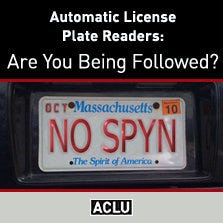ACLU: Automatic license plate readers threaten Americans’ privacy.

In July 2012, American Civil Liberties Union affiliates in 38 states sent requests to local police departments and state agencies that demand information on how they use automatic license plate readers (ALPR) to track and record Americans’ movements.
The ACLU and the ACLU of Massachusetts filed federal Freedom of Information Act requests with the Departments of Justice, Homeland Security, and Transportation to learn how the federal government funds ALPR expansion nationwide and uses the technology itself.
The ACLU wants six years worth of records regarding the purchase of ALPR devices, their use, department policies and how the information is stored and shared. The group is trying to get agencies to reveal just how widespread the tracking has become and for how long the information is kept. Most importantly, the group wants to know precisely who ends up with access to this information.
When used in a narrow and carefully regulated way, ALPRs can help police recover stolen cars and arrest people with outstanding warrants.
Unfortunately, law enforcement agencies are increasingly moving towards a “keep everything, share widely” formula concerning ALPR data. The biggest problem with ALPR systems is the creation of databases with location information on every motorist who encounters the system, not just those whom the government suspects of criminal activity. Police departments nationwide are using ALPR to quietly accumulate millions of plate records, storing them in backend databases. While we don’t know the full extent of this problem, we know that responsible deletion of data is the exception, not the norm. Only two states have passed legislation barring the retention of “non-hit” plate data for extended periods. On the other hand, we know for certain that some departments are eagerly engaging in this surreptitious data collection.
License plate tracking is a big business, and growing. As with so many other cutting-edge surveillance and identification tools, the Department of Homeland Security, Department of Justice and even the Department of Transportation have dished out many millions of dollars to state and local law enforcement for the purchase of ALPRs. Just a couple of years ago an ALPR unit cost about $22,000; market demand has already pushed the cost down to as little as $12,000 per unit, and it’ll likely dive further. The technology is flying off the shelf, and police couldn’t be more thrilled about what it enables, not least the retroactive, nationwide tracking of our every motoring move.
"It's not an exaggeration to say that in ten years there will be ALPRs just about everywhere, making detailed records of every driver's every movement, and storing it for who knows how long," wrote Kade Crockford, Director of the Technology for Liberty Project of the ACLU of Massachusetts, in a blog posting explaining the effort. "In some cases, we know that the worst-case scenario -- vast databases with records of movements of massive numbers of people -- is already happening. To avoid this fate we need to convince the nation and our lawmakers to take action on this serious threat to our liberty. And to make a convincing case, we need to know a lot more about the problem as it stands."
As license plate location data accumulates, the system ceases to be simply a mechanism enabling efficient police work and becomes a warrantless tracking tool, enabling retroactive surveillance of millions of people.
Location information can reveal deeply sensitive and intimate details of our lives. As the International Association of Chiefs of Police has put it, “mobile LPR cameras may collect the license plate numbers of vehicles parked at locations that, even though public, might be considered sensitive, such as doctor’ offices, clinics, churches, and addiction counseling meetings, among others.”
In a case in which law enforcement agents attached a GPS device to a car and tracked it for 28 days, Justice Alito explained that “society’s expectation has been that law enforcement agents and others would not—and indeed, in the main, simply could not—secretly monitor and catalogue every single movement of an individual’s car for a very long period.” ALPR systems pose the same risk, except they involve tracking all of us rather than specifically targeted individuals.
http://www.aclu.org/automatic-license-plate-readers-threat-americans-privacy
http://thenewspaper.com/news/38/3857.asp


